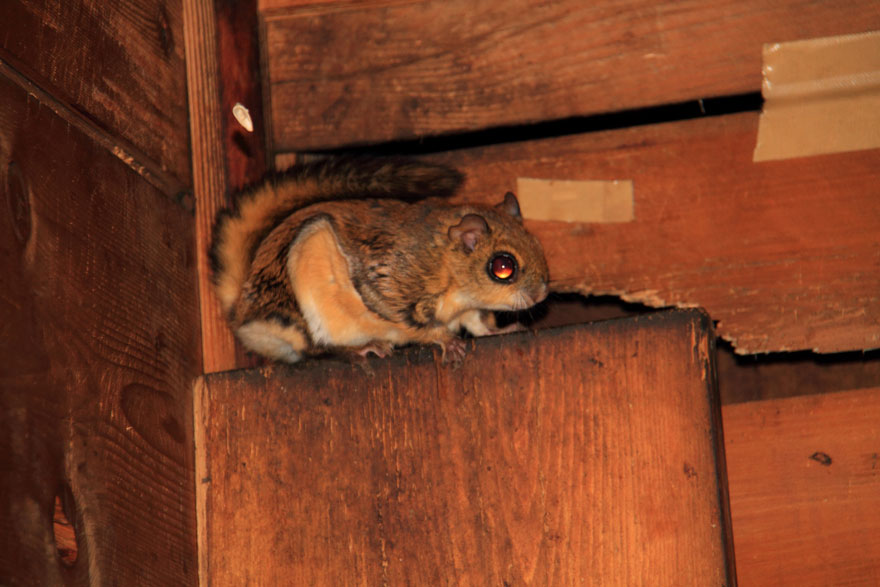- SPECIAL DISCOUNT
- 10% OFF on Full Home Recommendations + Free Consultation
- Excludes insulation services
- Contact Us
- Must mention at the time of booking
What Kind Of Damage Can Squirrels Do In Your House Attic In Denver, CO?

Squirrel infestations are a common issue for homeowners in Denver, CO. These agile rodents often seek shelter in attics. But how do squirrels in the attic damage your house, exactly?
They are known for chewing through materials, contaminating spaces with their droppings, causing structural damage, and more. Understanding the risks and knowing how to address these infestations can save you time, money, and stress.
This guide will walk you through the types of serious damage they can cause, and the best methods for managing and preventing these pests effectively.
Types of Damage by Different Squirrel Species
Different types of squirrels can present distinct problems to your properties. Flying squirrels, being nocturnal, often glide into your attic spaces and wall voids with ease, creating hidden issues.
Grey squirrels, highly adaptable, thrive in urban and suburban areas. Known for their acrobatic abilities, they can frequently reach into attics, gardens, and bird feeders, causing significant damage to your roof space, ornamental plants, and food crops.
Ground squirrels and chipmunks, which burrow extensively, can destabilize attics, lawns, and foundations. Worst of all, these tunnels provide even more entry points for other pests, thereby compounding your infestation problem.
Chewing Damage
One of the most concerning aspects of a squirrel infestation is the damage caused by their incessant chewing. Squirrels need to gnaw continuously to keep their teeth sharp and manageable, and unfortunately, your home’s materials often become their target.
Electrical wiring is particularly at risk. Chewed wires can lead to short circuits, power outages, and even electrical fires, posing a significant safety hazard to your household.
Beyond the danger to electrical systems, squirrels also cause structural damage. They frequently chew on wooden beams and supports, which can weaken the structural integrity of your attic over time. This damage can be expensive to repair and, if left unaddressed, may lead to more severe issues within your home’s structure.
Addressing these damages promptly is imperative to maintaining your home’s safety and efficiency.
Nesting Damage and Reproduction Risks
Insulation and ventilation systems are not immune to squirrel damage either. Squirrels in your attic can cause significant damage by using nesting materials that destroy insulation and ductwork.
They often tear apart insulation to build their nests, which reduces its effectiveness and will result in higher energy costs. Additionally, they might use materials that block ventilation systems, disrupting airflow and potentially leading to moisture buildup and mold growth.
Not to mention, squirrels reproduce very quickly, which compounds the damage over time. A single pair of squirrels can give birth to multiple litters annually, resulting in a rapidly growing population.
Naturally, as their numbers increase, so does the extent of the damage. The more squirrels in your attic means the more nesting materials they gather, leading to more extensive destruction.
Most significantly, once a squirrel population is established, removing them becomes that much more challenging. The longer they stay, the more they adapt to the space, making eradication efforts more complex and time-consuming.
This highlights the importance of early intervention and consistent monitoring to prevent a small problem from becoming a major infestation.
Contamination and Health Risks
Notably, squirrel infestations bring not only physical damage but also significant health risks. Accumulation of droppings and urine in your attic can bring about unpleasant odors that permeate your home. More seriously, these droppings can foster mold and mildew growth, which pose health risks, especially for those with respiratory conditions.
Squirrels can also spread diseases such as leptospirosis and salmonella through their waste. In addition, they often carry parasites like fleas, ticks, and mites, which can infest your home and affect your pets and family. Proper clean-up and sanitation are vital to mitigating these health hazards and maintaining a healthy living environment.
Preventing Squirrel Infestations
Preventing squirrel infestations involves regular inspections and proactive measures. Therefore, regularly checking your home for potential entry points is critical. Focus on areas like siding, roofing, eaves, vents, chimneys, and soffits. Look for any holes, gaps, or weak spots where squirrels might gain access.
Closing up any and all entryways is a vital step in squirrel prevention. Use durable materials like metal flashing and mesh to cover them up and repair any damaged roofing or siding promptly to eliminate easy access. Making sure that your chimneys and vents are covered with proper screens can also keep squirrels out.
Effective Squirrel Control Solutions at Best Pest & Wildlife Control
Squirrels can indeed cause considerable damage when they infest your attic, from chewing on electrical wires and structural beams to contaminating the space with droppings and urine.
They also cause significant destruction through their nesting and reproductive habits as well as pose health risks to your family. Taking preemptive steps will help you protect your home.
We offer in-depth squirrel control and wildlife removal services here at Best Pest & Wildlife Control. Our repair and remediation services along with our professional measures for pest protection can address your existing problems plus prevent future infestations.
Get in touch with us today at (833) 279-9453 to get started.
CONTACT US FOR A FREE QUOTE
Feel free to give us a call or send us an email with any questions or comments you have.
